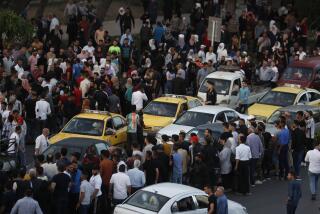Kashmir’s ‘Half-Widows’ in Limbo
- Share via
SRINAGAR, India — They’re pushed aside by their in-laws, shunned by neighbors, exploited by employers and harassed by security officers.
They are Kashmir’s “half-widows,” some 2,000 women whose husbands never returned home after security forces took them away for questioning as suspected separatists.
Only hope that their husbands-- and sons--will come back one day keeps the women going.
Under Islamic law, a woman can remarry four years after her husband disappears if sustained efforts have been made to find him. But the women don’t want to remarry.
“They keep hoping that their husbands will come back,” says Bashir Ahmad Dabla, a sociology professor who surveyed Kashmir’s half-widows last year.
Parveen Angher, a human-rights activist, has helped poor Muslim women file lawsuits seeking help from India’s government.
“They have no source of income. Their children usually don’t go to school. The women are in poor health. They mostly wait and weep,” she says.
Angher founded the Assn. of Parents of Disappeared Persons after police picked up her 15-year-old son nine years ago. He never came home.
In 1989, an insurrection erupted in the Kashmir Valley, a Muslim-majority area that Islamic militants want to break away from India, which is predominantly Hindu.
The guerrilla war has killed thousands. Security forces have special powers to detain anyone without giving reasons.
Hundreds of civilians have disappeared, some of them killed by guerrillas who suspected them of being police informers. Allegations of torture and human-rights abuses are numerous against both sides.
Zainam, a half-widow who, like others, asked to be identified only by her first name, says she hasn’t seen her husband since soldiers stormed her house one night three years ago.
“They beat my husband for two hours. He was screaming all the time. Then we didn’t hear anything. The soldiers left. We went upstairs. He was not there. . . . We never saw him again,” she says.
The illiterate mother of three says she has visited dozens of army camps and police stations looking for her husband.
She never went to school, like most women in this male-dominated Muslim region. She lives with her husband’s extended family.
She is weak from anemia and suffers from high blood pressure. Her eldest daughter has leucoderma, a skin condition marked by irregular white patches. Zainam has no money for medicine.
Rafiqua, another half-widow, says her in-laws sent her back to her parents a few months ago after complaining about the 10,000 rupees ($230) they spent looking for her husband. He was picked up by security forces in 1996.
Rafiqua says she worked from dawn to dusk for her in-laws and “they wouldn’t even buy me soap.” Now they want her back again.
“I’m like a servant in their house. But what can I do? I can’t go on living with my parents. They have other children to look after,” says Rafiqua, a mother of four at age 25.
Her son Faisal, 5, sits beside her quietly through the interview. “He is always quiet,” she says. “ . . . He is always depressed.”
The half-widows and their children all show symptoms of depression. Most of the women have heart ailments, says Dabla, the sociologist.
“The condition of the half-widows is worse than that of widows. They don’t know if their husbands are dead or alive,” Dabla says. “In Islamic society, women have few rights. These women are mostly illiterate and unemployable.”
Dabla found that children whose fathers have disappeared often drop out of school and develop minor criminal behavior. “The authority structure at home collapsed. The children especially develop a revenge psyche. If the security forces have taken away their fathers, they show anger toward the government and its agencies. If it was the militants, they want to take revenge,” Dabla says.
In an attempt to pressure the government into admitting the missing men were killed and to pay compensation to the families, human rights lawyer Parvez Imroz is helping 300 half-widows pursue lawsuits demanding that security forces produce the missing men.
The cases have dragged on, sometimes for 10 years, says Imroz, who pleads the cases without charge.
Imroz wants the government to pay the same 150,000 rupees ($3,500) it pays to relatives of people acknowledged to have been killed by security forces or by the separatists.
Police and security forces rarely admit they picked up the missing men. When there is evidence that officers did, officials say the men were released.
The head of the Jammu-Kashmir Human Rights Commission, Ghulam Ahmed Kuchchai, says he will insist the government pay compensation even if it has no information about the men’s whereabouts.
The commission, set up by the government in August 1997, is examining more than 300 complaints of human-rights abuses in Kashmir. It has no powers to punish anyone, but its recommendations are binding on the government.
More to Read
Sign up for Essential California
The most important California stories and recommendations in your inbox every morning.
You may occasionally receive promotional content from the Los Angeles Times.













